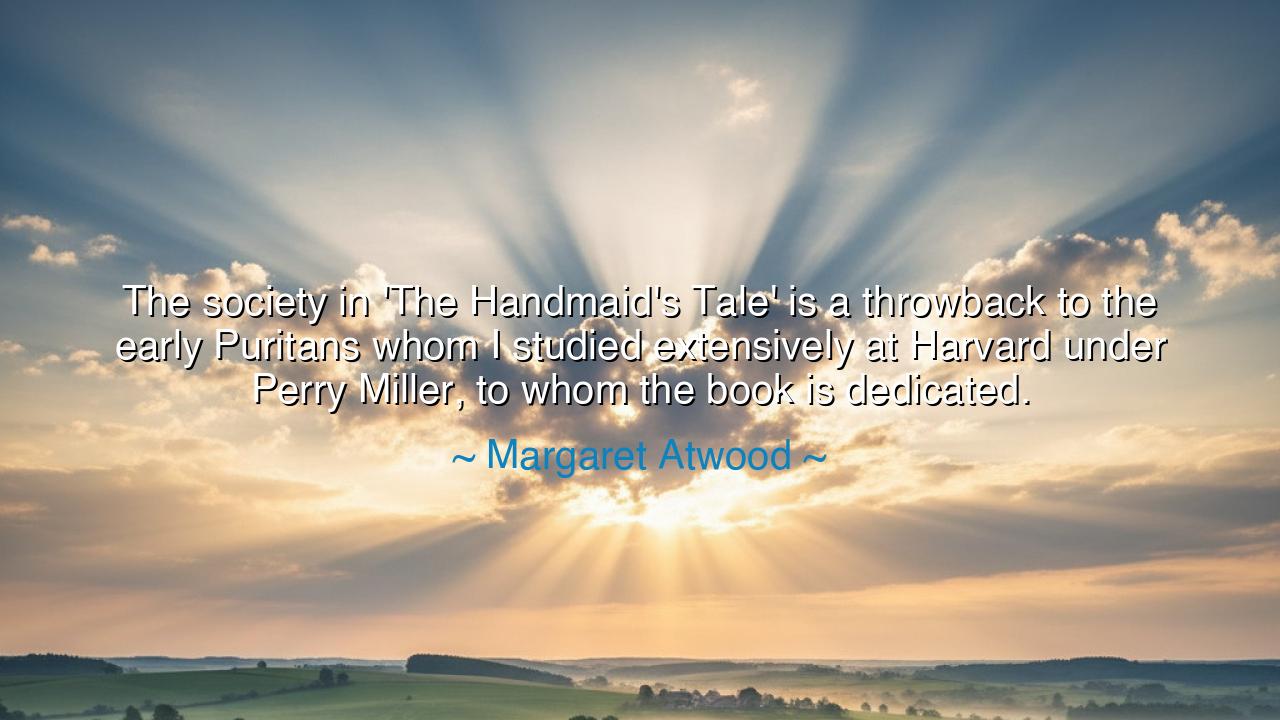
The society in 'The Handmaid's Tale' is a throwback to the early
The society in 'The Handmaid's Tale' is a throwback to the early Puritans whom I studied extensively at Harvard under Perry Miller, to whom the book is dedicated.






Hear the voice of Margaret Atwood, whose vision pierces through history and into the marrow of the present: “The society in ‘The Handmaid’s Tale’ is a throwback to the early Puritans whom I studied extensively at Harvard under Perry Miller, to whom the book is dedicated.” This is not merely a confession of inspiration—it is a revelation of roots. For the world of Gilead, grim and unyielding, did not rise from imagination alone, but from the pages of history, where zeal and control walked hand in hand. Atwood speaks as a prophet who has studied the past to warn the future, reminding us that the chains of yesterday can be forged again if vigilance falters.
The origin of her tale lies in the Puritan experiment of early America. The Puritans, fleeing persecution in Europe, sought to build a godly society in the New World. Yet their vision of purity often descended into rigidity and suppression. Their laws bound women in silence, limited freedom of conscience, and punished dissent with iron severity. What Atwood saw in their chronicles was not only faith, but fear—a fear that order could only be secured through domination. From that soil of zealotry, she drew the seeds of Gilead, a society where women’s bodies were controlled and individuality crushed beneath the banner of righteousness.
The Puritans believed they were building a city upon a hill, yet their light was shadowed by persecution of those who strayed from their creed. Recall the Salem witch trials, where hysteria and dogma swept through the people, and innocent women were condemned to death on whispers of sorcery. Here we see the living echo of Atwood’s vision: when fear grips society, when belief becomes weapon, the vulnerable are made scapegoats, and justice dissolves into cruelty. Salem stands as a mirror for Gilead, and a warning to all generations: beware the zeal that cloaks itself in holiness while wielding chains.
Atwood’s teacher, Perry Miller, was a scholar of Puritan thought, and through him she came to see not only their words but the spirit behind them. Her dedication to him is also a recognition that stories of the past shape the stories of the future. Gilead is not fantasy, but reflection—it gathers the fragments of history’s oppression and forges them into a world disturbingly familiar. Thus, Atwood reminds us: the horrors of Gilead are not invented, but remembered. And what has been before can be again.
The meaning of her words, then, is this: every society must examine its roots, lest they rise again in darker form. The chains of Puritanism—the control of thought, the silencing of women, the fear of freedom—may seem buried by centuries, yet they lie just beneath the soil, waiting for neglect or crisis to bring them forth. The handmaid’s red robe is but a symbol of all the ways humanity has clothed women in servitude and fear throughout history. Atwood speaks to warn that the past is never dead; it is a shadow that follows us always.
But take courage. For if the past can repeat its errors, so too can we repeat our resistance. Just as the oppressed of Salem were mourned and later vindicated, so too have countless women and men risen to resist societies that sought to bind them. In every age there are voices who cry against the chains, who lift the veil from tyranny disguised as piety. Their courage is the antidote to the terror of history repeating itself.
The lesson is clear: study the past, for in it lies the map of future dangers. Do not turn away from the chronicles of oppression, but face them, understand them, and learn. When laws begin to silence, when fear begins to rule, when the vulnerable are scapegoated for the comfort of the powerful—then sound the alarm, for Gilead stirs. Protect freedom not only in word, but in deed. Teach your children that democracy, compassion, and equality are fragile and must be guarded fiercely.
So let Atwood’s words be remembered as more than reflection—they are counsel for survival. The Puritans built with zeal, but also with chains. Gilead is their ghost, dressed anew. But the future need not repeat their shadow. If you would live free, then live watchful. If you would build a society of justice, then root it not in fear, but in compassion. And if ever the chains of Gilead appear again, may your voice rise to shatter them, as a warning to the world that the lessons of history have not been forgotten.






AAdministratorAdministrator
Welcome, honored guests. Please leave a comment, we will respond soon